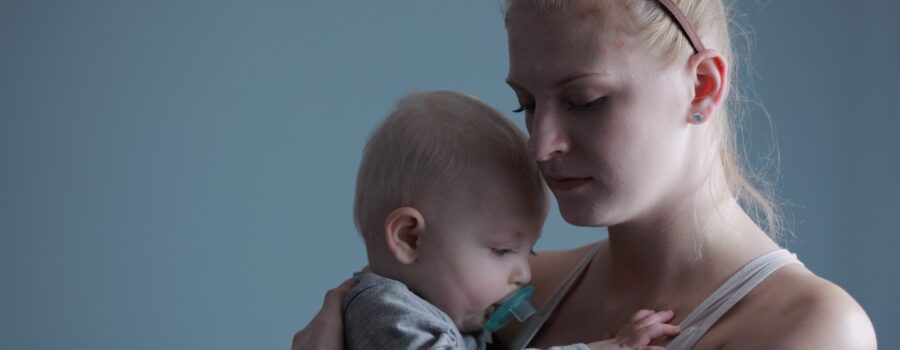You’ve probably heard of postpartum depression, and if you have, that’s great news! That means the times are changing and new moms are finally getting some of the information they need to understand how their mental health can change right after welcoming a new child. But it’s important to know that depression isn’t the only issue. Other postpartum mental health challenges should be on your radar, too.
We are here to help! So let’s get into them:
#1: Postpartum anxiety
Having a fragile, brand-new infant in your care fills most parents with some level of nervousness. That’s especially true if this is your first child. We suggest that you monitor how your anxiety levels change over time.
As you spend more time parenting, things will likely get more familiar and comfortable. However, if they don’t, you could be dealing with postpartum anxiety. If you’re losing sleep or struggling to leave the house because you’re afraid something bad will happen, talk to someone. Understanding your anxiety and developing a treatment plan can help you navigate this new season of life with fewer hurdles. And remember: you aren’t alone. On average, 7%-10% of women are diagnosed with postpartum panic disorder following childbirth.
You don’t necessarily need to be going through hormonal fluctuations to deal with postpartum mental health challenges, either. Some people deal with postpartum anxiety after adopting, as well. Although child-rearing can be a very exciting chapter, it’s also one that brings a lot of new responsibilities and this pressure can also feel overwhelming.
#2: Postpartum depression
We’d be remiss if we didn’t list the best-known condition when it comes to postpartum mental health challenges. Postpartum depression, or PPD, affects at least 10% of women who give birth.
It’s normal to experience low periods after becoming a new parent. Roughly 85% of women get the baby blues at some point. Again, though, it’s important to monitor how you’re feeling.
If the blues don’t come and go but seem to stick around, it could be PPD. You might feel continually sad, lose interest in things, have trouble sleeping, or have intrusive thoughts (including thoughts of harming yourself or your baby). You might feel irritable or anxious, too.
PPD isn’t something you should just wait out. Unfortunately, you can’t assume these feelings will fade quickly. Some women still felt depressive symptoms years after giving birth. Talking to a mental health professional helps you get the resources you need to take care of yourself if you’re living with PPD.
#3: Birth-related post-traumatic stress disorder (PTSD)
If childbirth was anything but smooth for you, it may have left you with some trauma. Look for the signs of PTSD, including flashbacks to or nightmares about the birth, obsessive thoughts about it, and panic near the birthing location. You might also feel numb and detached, depressed, or anxious.
You’ve probably heard time and again that childbirth is beautiful. That’s not always true. If you feel precisely the opposite about your own birth experience, talking with someone can help you process that trauma so it doesn’t have a negative impact on your life or your relationship with child-rearing moving forward.
#4: Obsessive-compulsive disorder (OCD)
Studies have also shown that some women develop symptoms of obsessive-compulsive disorder (OCD) after giving birth.
It almost makes sense. With the emphasis on keeping your new baby safe and healthy, many moms struggle to find the balance. Obsession with contamination or compulsion to constantly check your baby or clean their environment can interfere with your quality of life.
Although you have positive intentions when attempting to cultivate a safe environment for you and your new baby, notice whether or not the obsession to do so becomes impairing. Ultimately, OCD is an anxiety disorder and the thoughts and fears associated with this disorder can interfere with our opportunity for healthy relationships.
#5: Postpartum psychosis
This condition is rare, but it’s really worth mentioning. Postpartum psychosis can change your habits, behaviors, and even mental processes. You might suddenly stop eating, deal with memory loss, or experience hallucinations. You may feel paranoid or have frantic energy.
This condition is a mental health emergency. If your loved ones tell you that you don’t seem like yourself, listen to them and talk to a therapist about what you’re experiencing. If you begin to experience hallucinations, whether these are visual or auditory, it’s imperative that you connect with a medical professional as soon as you are able to, as these have the potential to lead to dangerous outcomes if untreated. Ultimately, after bringing a child into your home, a lot is changing in your life. And if you gave birth, a lot is changing in your body, too. Fortunately, you don’t have to navigate what’s ahead on your own. A caring, compassionate therapist who’s knowledgeable about postpartum mental health challenges can come alongside you. To find out more about what you’re experiencing and what you can do, get in touch with our team.





